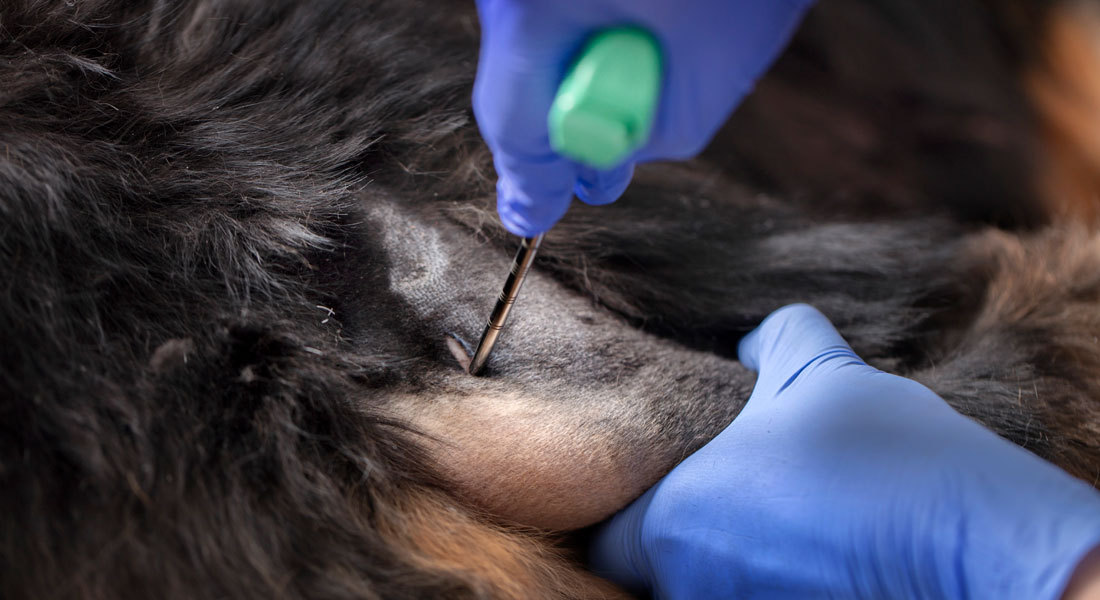Companion Animal Oncology – Medical Oncology II
This course is a specialisation course at the Master of Companion Animal Clinical Science. The Master is a post graduate education targeted small animal veterinarians seeking Continuing Professional Development (CPD).

The purpose of this course is to provide experience and expertise in the medical and multimodality management of companion animal cancer patients including indications for, planning of and administration of single and multiagent chemotherapy for the most commonly treated companion animal cancers and the principles and role of radiotherapy.
The mechanism of action, principles of use of cytostatic drugs as well as the administration as either single agent or multi agent protocols or as part of multimodality approaches in the treatment of the most common companion animal cancers will be part of this module.
Furthermore classification, monitoring and prevention and management of chemotherapy adverse effects according to the guidelines established by VCOG (Veterinary Comparative Oncology Group).
Each participant makes procedures for the treatment protocols used to treat the most common companion animal medical oncology patients for their own practice.
Read more about the Master of Companion Animal Clinical Science.
Lectures, Theoretical and practical exercises. Case studies.
Having completed the course, the student must be able to:
Knowledge
- Describe and reflect about common ethical, safety, and environmental considerations in treatment with cytostatic drugs in companion animal cancer patients.
- Define, identify and demonstrate overview of commonly used companion animal cancer chemotherapy protocols and multimodality approaches to therapeutic management.
- List, classify, and demonstrate critical reflection on existing and new medical or combined approaches to oncology patient therapy and client education.
- Demonstrate appropriate understanding regarding nutrition, nutraceuticals and supplementary therapies in veterinary cancer patients.
- Be current on specific blood product transfusion-guidelines and demonstrate an understanding of hemostatic disorders in veterinary cancer patients.
- Have an in depth knowledge of cancer related pain.
- Understand the use of radiotherapy in veterinary cancer patients for their own practice.
Skills
- Use appropriate procedures and administration protocols for medical management and follow up of specific companion animal cancer types.
- Interpret, assess and reflect on stage and grade of cancer in relation to planning of the therapeutic approach incl. which modalities, protocol and the administration of chemotherapy in individual patients.
- Plan, apply and integrate new evidence based scientific approaches to plan and administer medical therapy in companion animal cancer patients, pain management, nutritional management and other supportive therapy.
- Detect, assess and address adverse effects to cancer chemotherapy effectively and in a timely fashion.
- Communicate effectively in writing and pass on therapeutic results to relevant parties.
Competences
- Evaluate and manage the medical therapy of companion animal cancer patients which may necessitate novel solutions and approaches identified from current medical literature or other ressources as they pertain to the individual patient.
- Work independently, take responsibility for, predict, and prognosticate based on response to therapy for commonly medically treated companion animal cancers.
- Collaborate constructively within and between specialists/professionals and lay persons involved in companion animal medical cancer treatment.
- Independently evaluate and structure own learning processes and continuously obtain new knowledge within the medical management of companion animal cancer patients.
You must meet the following criteria to be admitted to this course:
- Hold a degree in Veterinary Medicine.
- Hold one of the following certifications:
- DVA Certificate in Small Animal Diseases (equivalent to the 4 compulsory courses of the Master of Companion Animal Clinical Science).
- Swedish / Norwegian / Finnish specialist in diseases of dogs and cats.
- Equivalent competences.
- Have a minimum of 2 years of relevant work experience from companion animal practice.
- Be proficient in English.
Find detailed information about the formal requirements for this course.
The course responsible at the specialisation track in Companion Animal Oncology is:
- Associate Professor (oncology) Maja Louise Arendt, DVM, PhD, resident ECVIM-CA (onc), University of Copenhagen.
Lecturers at the specialisation track are:
- Professor (oncology) Annemarie Thuri Kristensen, DVM, PhD, DECVIM-CA (onc), DACVIM-SA, University of Copenhagen.
- Guest researcher Majbritt Estrup Larsen
- Assistent Professor (oncology) Betina Børresen, DVM, PhD, resident ECVIM-CA (onc), University of Copenhagen.
- Other national and international capacities within the field.
Course details
| Duration: | 5 days |
| Dates: | Offered next time fall 2026 |
| Frequency: | Only available every second year |
| Course capacity: | 12 students |
| Place: | University Hospital for Companion Animals, Frederiksberg, Denmark |
| Course fee: | EU/EEA citizens Single course participant: 33,500 DKK Master student: 30,000 DKK Non-EU/EEA citizens Single course participant: 37,740 DKK Master student: 34,240 DKK Tuition fees include course materials and lunch/coffee. Books are not included in the tuition fees and must be purchased by the participants. |
| Level and credit: | Master course; 6 ECTS |
| Examination date: | Please consult the exam schedule |
| Application deadline: | Master's programme: 1 May 2025 Course: September 2026 |
| Admission: | To be admitted, you must meet the admission criteria for specialisations at Master of Companion Animal Clinical Science |
The opening of the application period is announced via the programme newsletter.
Download course curriculum
